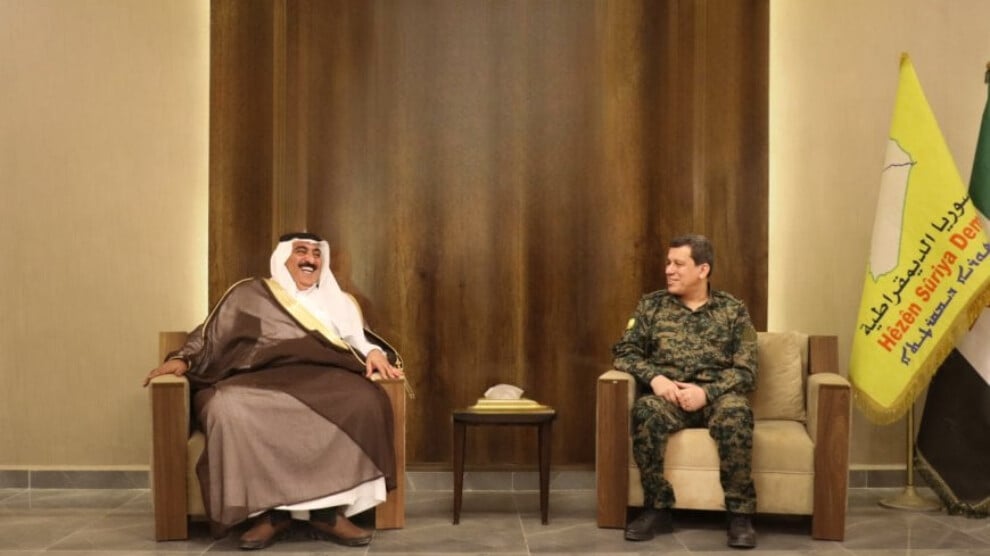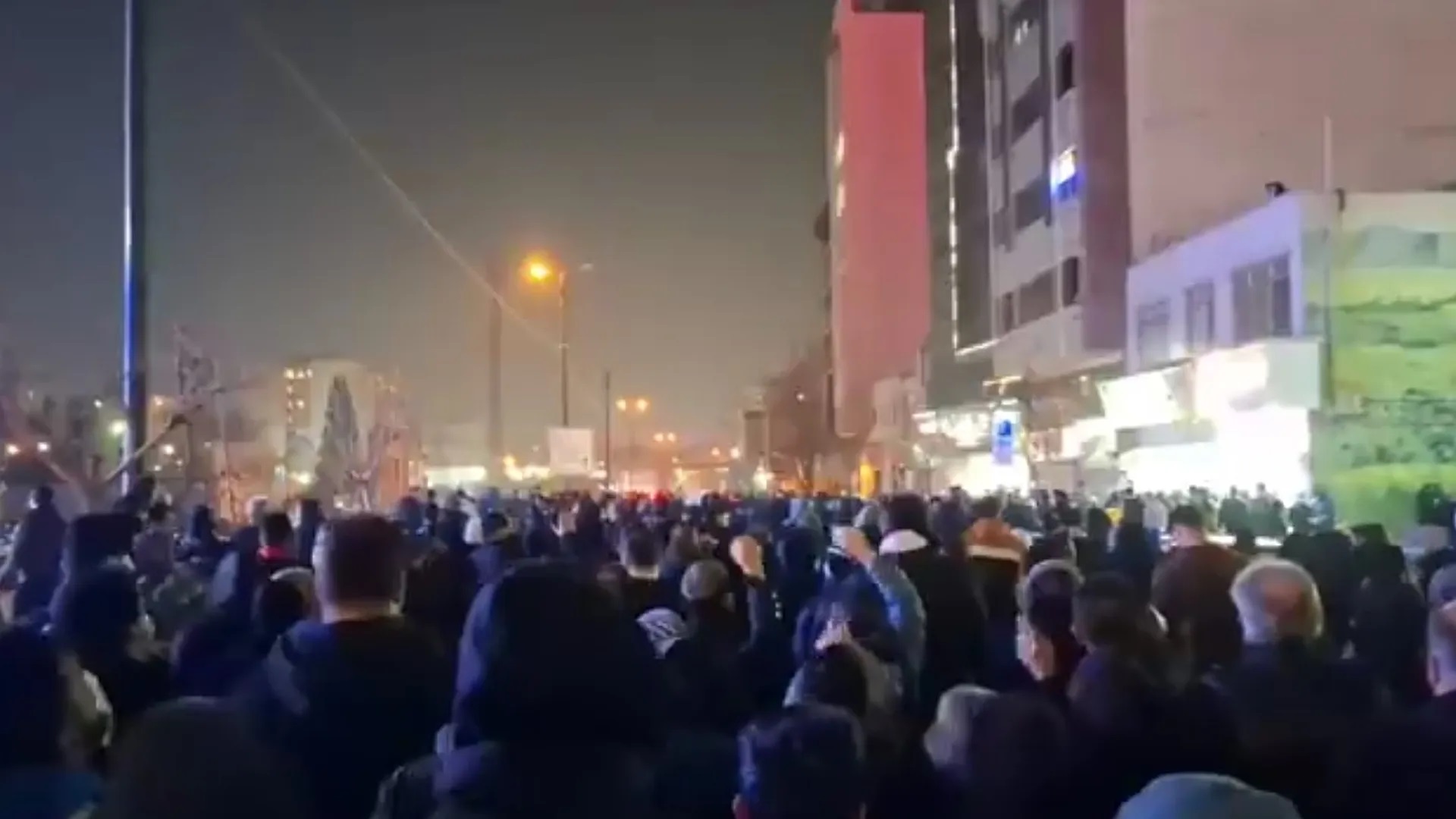Crackdowns on ‘Alawi neighborhoods’ in Damascus intensifies
On Thursday, August 28, 2025, armed forces raided the popular al-Sumaria neighborhood in Damascus, which is located about 3 kilometers from the capital and a few kilometers from the presidential palace. Without being presented with legal eviction notices or any official documents identifying the forces, the residents were ordered to evacuate their homes within 72 hours. According to reports, the personnel then began tearing up the resident’s property ownership papers, forcing them to sign documents relinquishing their homes, amid threats of armed violence and arrests targeting young men and minors.
Residents of the neighborhood witnessed arbitrary arrests, beatings, and humiliation, especially if they attempted to protest or record the events.
Residents of the neighborhood witnessed arbitrary arrests, beatings, and humiliation, especially if they attempted to protest or record the events. Journalists were barred from entering the area, and some members of the armed group reportedly used swords to intimidate civilians, according to the Syrian Observatory for Human Rights. Social media circulated a video showing a group of women confronting the armed men and demanding they leave. But the response was violence and intimidation.
The al-Sumaria neighborhood was originally built in the 1980s by what was known as the Defense Companies, a paramilitary force within the former Syrian army under Rifaat al-Assad. Unverified accounts suggest that parts of land were taken from the area, known as Muadamiyat, and distributed to army officers. They constructed homes there, naming the neighborhood al-Sumaria. The recent armed raids, conducted in the aftermath of the fall of Bashar al-Assad, aim at expelling the mostly ‘Alawi civilians from their neighborhoods.
Although the bulk of the ‘Alawi community is not related to the regime’s brutality, the power takeover of Sunni Islamist rebel factions led to widespread discrimination and violence against the ‘Alawis
Until December 8, 2024, the al-Assad family had ruled Syria for more than sixty years. Although the bulk of the ‘Alawi community is not related to the regime’s brutality, the power takeover of Sunni Islamist rebel factions led to widespread discrimination and violence against the ‘Alawis, culminating in a large massacre targeting the community in March 2025. Similar attacks affected other Syrian communities, such as the Druze in Suwaida, who do not wish to see the Sunni-dominated sectarian government of Ahmad al-Sharaa rule over them.
Testimonies from al-Sumaria Neighborhood
The day after the recent raid, residents of al-Sumaria headed to the Damascus Governorate building to protest the eviction orders. There, they were informed that the evacuation operations were unlawful, although field personnel had insisted that they had been acting under directives from higher authorities. The raids resulted in several families leaving their homes—some sought refuge with relatives in the Mezzeh Jabal neighborhood, while others remained in public parks and open spaces. Yet others returned to their villages along the Syrian coast.
Local sources inside al-Sumaria told The Amargi that on the morning of August 28, residents were informed by the neighborhood committee that a delegation from the Governorate would arrive to inspect property ownership and official documents proving their legal residence. Instead, armed personnel entered the neighborhood and began intimidating residents, demanding they vacate their homes.
Several homes were reportedly looted. Several young men from the neighborhood were arrested. The following day, residents noticed X marks painted on some houses. They were later told by the new regime authorities in Syria that these were scheduled for demolition.
” If the state intends to reclaim the land on which al-Sumaria neighborhood was built, it must first provide alternatives for civilians—not force them out at gunpoint.”
Ms. Hiyam Ali, a resident of al-Sumaria neighborhood, said that more than half of the families left the neighborhood. Meanwhile, people hope for a legal solution: “If these lands belong to the state, then let it take them, but where are we supposed to go with our families and children, especially when we were ordered to evacuate our homes within hours? We are poor families; we don’t have enough money to rent or buy another home.” She stressed that everyone should be able to claim their rights without sectarian intimidation or insults. Without alternative solutions from the state, many would be left forcibly displaced or on the streets, she said. Echoing this sentiment, Wael Ossi, a resident of Muadamiyat neighborhood, stated: “We are against violence and intimidation. We stand for the rule of law. We do not accept the forced displacement of any family from their home. If the state intends to reclaim the land on which al-Sumaria neighborhood was built, it must first provide alternatives for civilians—not force them out at gunpoint. The revolution was supposed to end oppression and achieve justice, not take revenge on civilians.”
Humanitarian Support
Media outlets circulated testimonies from residents of the al-Sumaria neighborhood stating that they received verbal threats. Others reported receiving death threats should they decide to stay, which triggered a wave of displacement from the area. In response, the Inmaa– Western Syria Organization announced that it has opened its doors to assist the displaced families.
Rana Hassan, Communications and Public Relations Coordinator at Inmaa told The Amargi: “More than 250 families have contacted our organization seeking shelter after being displaced from the al-Sumaria neighborhood, and the number continues to grow.” She relayed that most of the displaced families moved in with relatives in nearby Damascus neighborhoods, while over a third chose to relocate to areas along the Syrian coast. “We assisted these families in transporting their household belongings upon request, and we provided support in securing food, medicine, emergency relief, and cash assistance. Additionally, we are working on an instant electronic system to accurately register and document all incoming requests.”
The organization is documenting cases of forced eviction and displacement, in collaboration with partner lawyers who provide free legal consultations and file formal complaints. The organization’s legal team also records violations and shares them with international decision-making bodies and human rights organizations.
Legal Perspective
Speaking to The Amargi, lawyer Rami Jalbout, explained that there is no legal basis in Syrian law or international law for the eviction operations currently taking place in Syria. He added: “Article 49 of the Fourth Geneva Convention of 1949 explicitly prohibits forced displacement in any form. The only exceptions permitted under this article apply in extremely limited circumstances—specifically, if the displacement is necessary to protect the civilians themselves from imminent danger, or due to imperative military reasons, and only for a temporary and defined period.”
“Forced eviction without a legal basis is prohibited.”
As for Syrian constitutional and civil law, there is no provision permitting such actions. On the contrary, all relevant legal texts emphasize the protection of private property and prohibit its confiscation except through lawful expropriation for public benefit, and only after fair compensation has been provided.
Commenting on Syrian law regarding eviction and displacement, Jalbout states that it is not permissible to expropriate any property arbitrarily according to the constitutional declaration. “Forced eviction without a legal basis is prohibited. A legal basis might exist when a tenant whose lease has expired refuses to return the property to its rightful owner. In such cases, eviction must be carried out through the competent judicial authority.”
Similarly, if someone unlawfully seizes a property, the owner must resort to the courts to request eviction. The law grants the judiciary—not individual property owners—the authority to enforce eviction.
Jalbout explains that ownership documents are generally to be replaced in case of damage. However, due to the specific circumstances in Syria, sometimes the only proof of ownership is a written contract between the relevant parties. The destruction of such a document results in the loss of ownership evidence. Alternative means of proving evidence can be pursued and presented before the judiciary.
The process of expropriating real estate for public benefit projects is a formal procedure that must be handled with extreme caution and within specific legal frameworks and timeframes. It requires fair compensation for the property being expropriated.
The process begins with preliminary planning for a public benefit project, followed by initial warnings that specify deadlines, and then final notices for the evacuation of the occupants—only after they have received fair compensation. This process includes legally defined periods for objections and judicial review. Once all disputes are resolved through final court rulings, the entity benefiting from the expropriation may proceed with implementation.
Any deviation from this legal process transforms what should be a lawful eviction into an unlawful forced displacement. Such violations constitute crimes under both Syrian domestic law and international law, where forced displacement is considered a war crime under humanitarian standards.
According to lawyer Jalbout, when state authorities compel occupants to sign an evacuation pledge without any legal justification or supporting documentation, such coercion renders the action legally invalid. In fact, such forced signatures may serve as evidence of the crime of forced displacement.
So far, there is no judicial ruling resolving property disputes, nor any legal decision ordering the handover of homes or real estate. In fact, no legal procedure preceded the forced displacement that took place in al-Sumaria. This makes the evictions, carried out by military forces despite no imminent danger, a crime.
Suha Kamel
Syrian journalist working in the field of digital media and investigative journalism.



